To stop a puppy from biting 🐶, I recommend ignoring the puppy’s biting and rewarding calm behavior.
But that’s easier said than done!
Remember, it’s totally normal for a puppy to bite.
Some new puppy owners are surprised and worried that their puppy might be aggressive but unfortunately almost all puppies bite.
They bite because they explore with their mouths and that’s how puppies and dogs play with one another.
So puppies bite us as well, but they do not understand they are hurting us!
We have to teach them not to bite us.
Most puppies start teething at around 12 weeks old when they begin to lose their puppy teeth. For some puppies, the biting gets even worse during this stage.
So, here are some of my ideas on how to teach your puppy not to bite you!
QUICK RECOMMENDATION: My puppies have drawn blood with their teeth many times. The Milunova Pupr Pals™ Dog Toy is a plush squirrel puppet toy that helps to protect your hands from those sharp puppy teeth during play.
How to Stop a Puppy From Biting 🐶
1. Use a firm “NO!” to stop puppy biting
Some dog trainers who say you should never tell a dog “no” because that could be viewed as punishment and you don’t want to “scare” your puppy.
I like to use “no” in a calm voice to communicate with my dog or puppy to stop doing what they are doing. Then I reward them immediately for stopping that behavior.
A problem that is far more likely to occur when you tell a puppy “no” is your puppy views “no” as attention! Because you are in fact giving the puppy attention!
That’s why ignoring unwanted behavior like biting is often the best choice. This might mean you have to physically get up and leave the room for 2 minutes or so or step over a baby gate.
See my post: How to stop a puppy’s bad behavior
2. Ignore your puppy to stop the biting.
Usually a puppy is asking for your attention when she’s biting at you, but she’s asking for attention in a rude way.
The advice many trainers will give is to just turn your back to the puppy and ignore her, which is great advice.
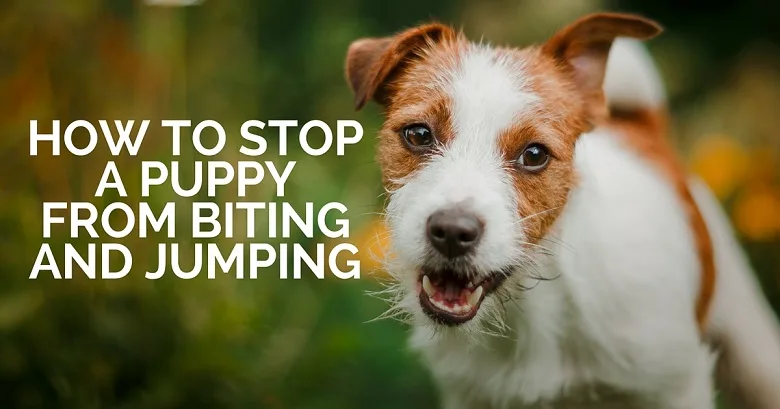
However, some puppies will make this into a game. When my dog Remy was a puppy, he loved to just run around me in circles jumping and biting at me from whatever way I turned.
If your dog does this, one thing you can do is just stand tall and completely still with a straight face, ignoring her 100 percent. Then, either wait for her to calm down or simply turn your back to her and calmly walk away to focus your attention on something else.
You could stare at your phone or sit on a tall stool and pretend your puppy doesn’t exist. Give her the cold shoulder, basically.
I noticed this was my old dog Ace’s method for ignoring Remy. When Remy became a pest, Ace would stand completely still without acknowledging him. It worked.
You just have to follow through and truly ignore the pup for a minute or two, which is not easy to do. However, they do usually get bored by then and move on.
If needed, I calmly put the puppy in her kennel for a break with a chew toy or bully stick. This is not a punishment. It’s to give her some downtime with a bone or something to chew on.
3. Hand the puppy a toy to stop the biting.
When my past foster dog Lana would bite at me for attention, one option was to hand her one of her toys and then praise her for biting the toy instead of me.
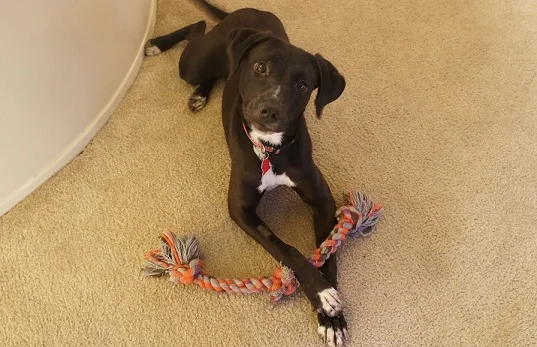
4. Say ‘ouch!’ or “yelp” when the puppy bites you.
It can be really effective to “yelp” or say “ouch!” in a high-pitched voice when a puppy bites because this is how another dog or pup would communicate “Ouch! You’re too rough!”
This works for some puppies, and it just gets other pups even more “riled up.” It helps to consistently ignore the puppy after you “yelp.” I recommend standing up and walking away without saying anything and without looking at the dog. You bite me. Fun is over.
The good news is you only need to ignore the dog for about 1 or 2 minutes (short attention spans). Just be prepared to walk away again if she bites when you return.
Jen Gabbard of the blog Puppy Leaks covered this topic, and I thought it was an important post because the “yelping” method actually made her puppy Laika bite harder!
From Puppy Leaks:
Try yelping they said, it will stop the biting they said.
So I did, I tried yelping. Every time Laika touched my skin with those teeth I let out a high pitch yelp. In theory this is the same method used by other dogs to let them know “ow that hurts” and that the game is over.
You know what happened when I yelped at Laika? She started charging me even more.
She wasn’t just giving out nips anymore, she went into full on frenzy attack mode. When I yelped it was her signal to go full force – she not only continued biting but she added leaping, lunging, growling, and tugging into the mix.
I really liked the post, because Jen’s issue is a problem I’ve had with puppies too.
The puppy is either more excited by my “yelping.” Or, she ignores my yelping and continues to bite or even views the yelping as attention!
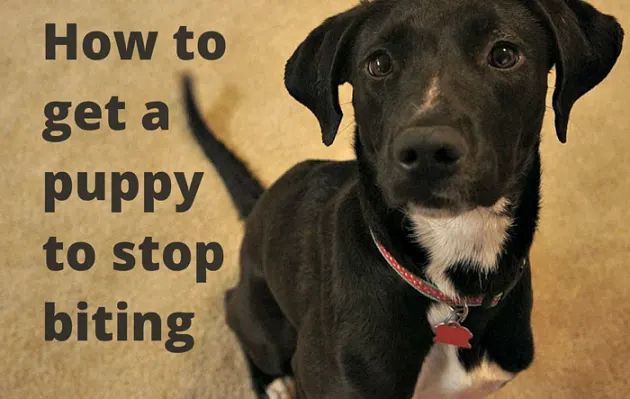
Besides “yelping,” there are other ways to stop a puppy from biting that we’ve already mentioned such as:
- Telling the puppy “no”
- Ignoring the puppy (no attention for biting!)
- Distracting a puppy with a toy
5. Bitter apple spray on your hands.
Bitter Apple spray is a training product you can spray on your own hands. Dogs and puppies usually do not like the taste of bitter apple, so they learn not to bite your hands in order to avoid the taste.
However, the downside to this is if the bitter apple spray is on your hands you can easily get it on your face, on your furniture and on everything!
So, consider this as an option for certain situations. It does easily wash off and should not stain your carpet or furniture.
6. Use a leash for more control to stop puppy biting.
Since our foster puppy Lana did not have a lot of obedience training, I couldn’t tell her to stay on a dog bed. I could put her in her crate with a chew toy, but I wanted her to learn to be calm outside of her crate.
So, one option was to put her leash on her, have her lie down at my feet with a toy, and then step on the leash so she couldn’t move too far. This was an option for when we were doing something like watching TV.
This didn’t work for my puppy Remy. He just chewed the leash. Sigh.
You could try a chain leash or chew proof cable leash if you have a puppy who likes to bite the leash.
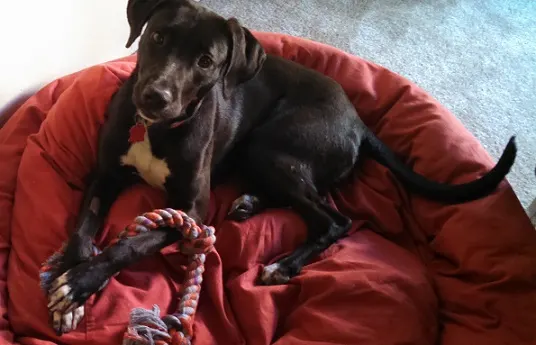
More tips to stop a puppy from biting
7. Provide the puppy with plenty of exercise.
If a puppy is annoying and “crazy,” it’s honestly hard to tell if it’s due to a lack of exercise or from being overly tired. Puppies actually need a lot of sleep and down time and sometimes they are on their worst behavior in the evenings when they are the most tired.
(I have a whole article on this topic: Why is my puppy so wild in the evenings?)
So, it’s a balance.
You should take your puppy out for a couple of walks and play sessions at least three times a day. And you should spend a few minutes working on training a couple of times per day.
If you are doing that, then you don’t need to feel bad about providing your puppy with some down time in her kennel every day. Provide her with some special chews or puzzle toys in there. She will most likely chew for a bit and then fall asleep.
It’s just so much easier for the puppy to settle down if she’s at least somewhat tired.
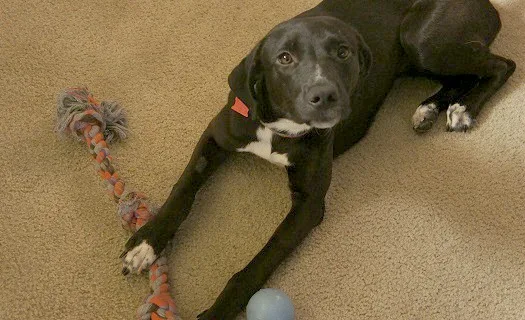
8. Work on training your puppy every day.
Work with your puppy for a couple of 5-minute training sessions each day.
This will help you in a number of ways! First, it will give your puppy more interaction with you. Second, it will help tire your puppy out mentally. Third, learning basic obedience will help with your puppy’s overall self control.
Begin to teach your puppy the basics like sit, down, stay and come.
Use high-valued treats and reward your puppy frequently.
9. Feed the puppy from Kong toys and other puzzle toys.
I stopped feeding our foster dog Lana from a bowl.
Instead, she got food during training sessions or in her Kong-type toys. This made her drain some of her mental and emotional energy, plus it gave her something to do and a reward for her “work.”
See our post: How to stop a puppy from chewing
I generally do not recommend these options:
These options DO work for some puppies but for the most part tend to get the puppy more excited.
These are worth considering though, especially if they have worked for you in the past. Note that positive reinforcement trainers will not recommend these options.
Hold the puppy’s mouth shut to stop the nipping.
This works for some puppies. You simply hold their mouth closed for a few seconds and say “no.”
Grab the puppy by the scruff.
This is a similar option to grabbing the puppy’s mouth. It works for some but many will just enjoy the attention. Hold their scruff for second and give a firm “no.” Then redirect them to a toy.
Use a squirt bottle to stop puppy biting.
Again, this might be worth considering but it’s not my first recommendation. Too many puppies will think a water bottle is a fun game!
Reaching your fingers into your pup’s mouth to stop biting
This is an uncomfortable feeling for the puppy and might be enough to stop them from biting your hands. Obviously they’ll probably try to nip you in the process so I don’t recommend this option.
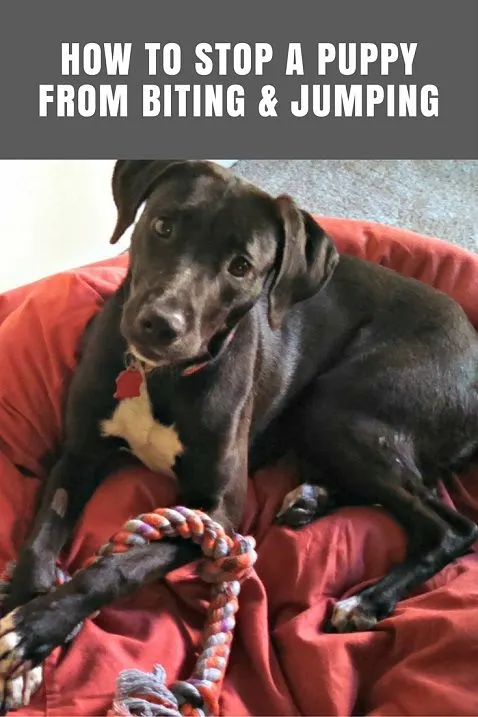
What age does a puppy stop biting?
This depends on the puppy! Some puppies barely bite at all. Others continue to mouth and bite for years! Unfortunately my dog is 3 years old and still likes to mouth hands when he’s excited.
See our post: How to stop an adult dog from mouthing hands.
8 week old puppy biting
Most 8 week old puppies are going to bite a lot! They are immature, they’re teething and they try to bite or pick up anything in their mouths!
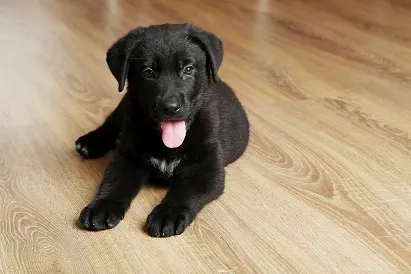
This is also a very “wild” puppy stage where the puppy has tons of energy, which often makes them bite even more!
See our post: Why is my puppy so crazy at night?
6 month old puppy biting
If your puppy is still biting at 6 months, don’t worry. Some puppies are really immature (like my Remy) and will continue biting and mouthing.
Your best bet is to NOT ENGAGE with this behavior. Ignore your dog. Don’t play with him when he bites as this just encourages them to bite more.
Do puppies grow out of biting?
Yes, most do. Once the puppy is done teething and has had some training and time to mature they usually stop biting by 6 months or sooner.
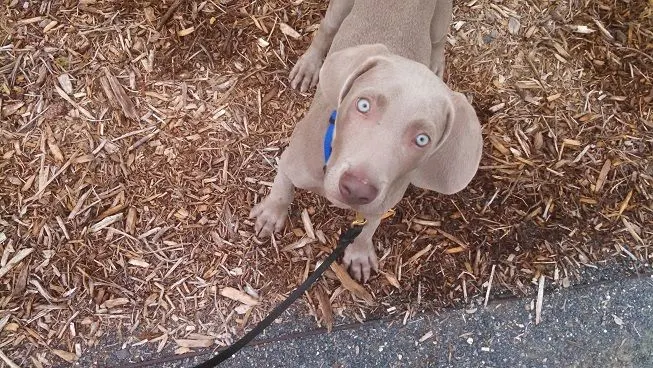
Some older puppies and adult dogs will still “mouth” and bite for attention and if that’s the case with your dog you should follow some of the suggestions in this post. It also doesn’t hurt to work with a trainer for some tips.
You can also spend some time working on your puppy or dog’s impulse control, which should also help to reduce biting.
How to stop a puppy from biting feet?
Some puppies like to bite at people’s feet, shoelaces or pant legs for attention or as a way to play. They don’t understand that this hurts or that they’re ruining your clothes!
If your puppy bites at your feet, you can try some of the above suggestions such as:
- squirting the puppy with water
- handing the puppy a rope toy or something more appropriate to bite
- getting up and calmly leaving the room for a moment
A combination of these things may work the best. Try mixing up the chew toys available so your puppy stays interested in her toys and bones.
What to do if a puppy draws blood?
Unfortunately, it’s normal for a puppy to draw blood on occasion during their wild, biting phases.
If your puppy gets this rough, I recommend you ignore him by stepping over the puppy gate for a few minutes or put him in a crate for some downtime with a chew toy.
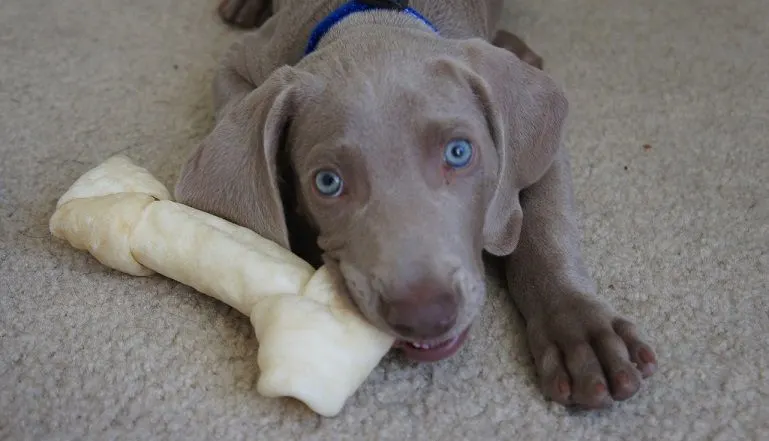
If your puppy draws blood, take normal precautions such as washing the puncture or scratch with warm, soapy water and putting antibiotic cream on it with a bandage.
For the most part, you shouldn’t have to worry about infection and getting antibiotics unless it’s a deep puncture.
What ideas do the rest of you have to stop a puppy from biting?
Let us know in the comments!
Related articles:
How to get your hyper dog to relax
Help! My dog is out of control!

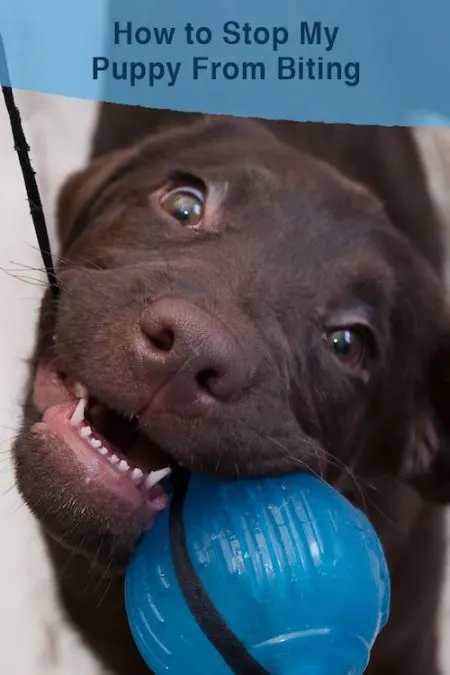
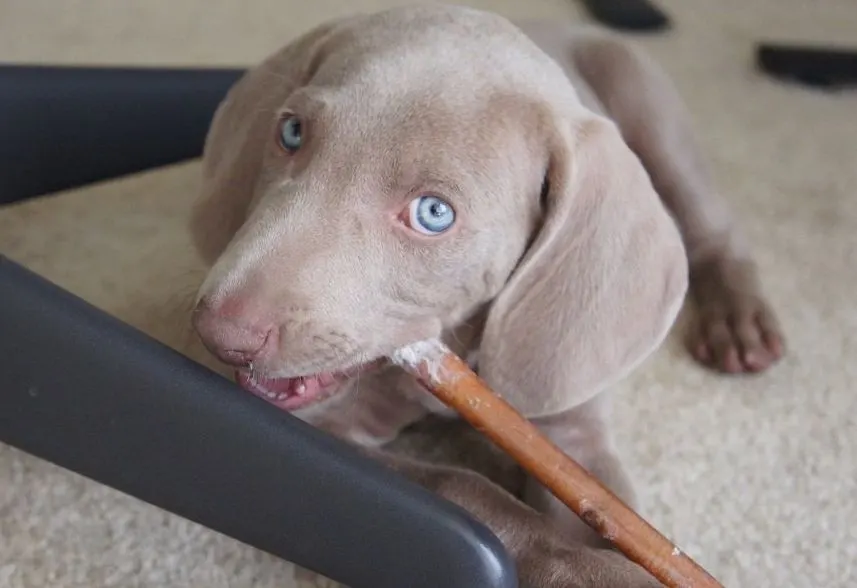
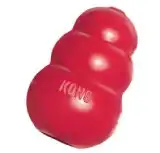
Bronwyn
Monday 18th of May 2020
Biting for attention was a real problem for us. We found that making sure we told her she was good, gave a quick pat or even tossed a little treat when she played by herself worked best along with as little attention as possible for the jumping up and biting. She learned how to entertain herself more too. Lots of exercise helped a lot too.
Kim Chappell
Monday 18th of May 2020
Hello, thanks for the article . Here is my article on training the OUT command, feel free to copy and share it. It is my most popular article- the exercise is effective, and gives the pup an outlet to bite appropriately:
https://www.facebook.com/AllBasicsDogTrainingKimChappell/posts/114959916867786?__tn__=K-R
Renee E Jacobs
Sunday 17th of May 2020
Rosee is a year old and she still bites. She thinks it's play when she she runs around the house jumping on furniture (don't judge), which is why I have to keep her separated from her grumpy 5 year old sister.
Jan
Tuesday 23rd of July 2019
Contrary to some I think NO is an important word for puppies to learn. Used sparingly it can help define good behavior for life.
Lindsay Stordahl
Tuesday 23rd of July 2019
Yep, so true!